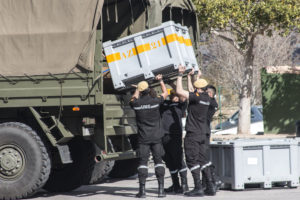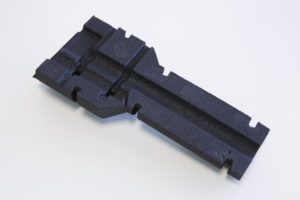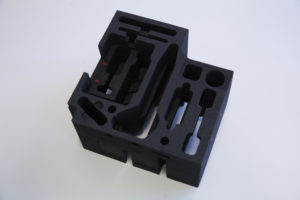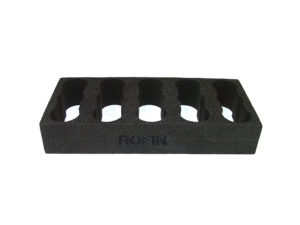
Well-packaged defence equipment, safely delivered, can be the difference between life and death for the solider on the front line. Here, Kewell Converters Consultant Chris Simpson tells MOD DCB features editor Julie Shennan about the vital role secure packaging plays in meeting defence requirements in the field.
Founded in 1971 and based in Kent, Kewell Converters Ltd (KCL) is a specialist foam fabricator and foam converter whose services have helped deliver equipment safely to the Armed Forces over many years. Specialising in high density, engineered performance, regular and explosive compatible packaging, it wasn’t long before Kewell found its place in the defence supply chain.
Kewell Converters Consultant Chris Simpson explained: “Kewell Converters first got a foothold in the defence marketplace through pyrotechnics. In the late 70s and early 80s Kewell had relationships with Brocks and a pyrotechnics company that had a lot of Ministry of Defence contracts. By networking with them Kewell ended up talking to the MOD and eventually doing business with them and supplying secure packaging to them.”
With this business comes great responsibility, as Mr Simpson noted: “Secure packaging is critical to the defence marketplace, because having equipment turn up in a training environment or field operation and then discovering that it doesn’t work is just not an option. People expect the packaging to do its job.

“Quite often pieces of defence kit are stored for long periods without being used, so the durability of defence packaging is critical. End users need to be able to draw a piece of kit out of a box years after it has been stored and have it work in the exact same way as it did at the time you stored it.”
Now having worked with both defence and civil clients, Kewell has experienced at first hand the difference between the two marketplaces.
Mr Simpson said: “The main difference between supplying to the defence and commercial sectors is the purchasing requirements; defence contract notices can be laid out in a more exacting way than in a civil process, because there has to be a formulaic structure to avoid misinterpretation. However, this can make it quite difficult to talk to people about what is required. Often there is a much greater sensitivity in the defence marketplace than in the commercial.
“If you are looking to supply to an area such as the automotive industry – where the product design process is very secretive – then it can help if you mention that you have experience supplying to defence, which is renowned for its confidential procurement processes.”
Supplying to defence also involves other positive procurement practices, as Mr Simpson explained: “Defence Standards make it quite simple to discover what it is that you need to do to fulfil the contract. These standards are published quite widely and this makes it a relatively simple marketplace to enter.
“There are a lot of people who think defence business is more complicated than it actually is. Sure, the lead time for defence business can be longer than in the commercial sphere, but the business is more reliable and the sector contains some great customers if you can meet the stringent MOD / Defence Standards and military specifications.”
To access these customers, suppliers must first introduce themselves to then cultivate and build successful relations, often over prolonged periods of time, demonstrating and maintaining high levels of both smart design input and modern manufacturing capabilities. As a result, you can become a trusted and reliable partner within this global industry of huge potential.

Mr Simpson commented: “The Defence Growth Partnership and techUK are great for finding information on entering the defence marketplace, but nothing beats face-to-face networking.
“For instance, last year Kewell were represented at DPRTE where we met both defence buyers and suppliers. In events like this, if suppliers are not in direct competition with you they are usually quite happy to give you advice on how to approach the marketplace. If you look at exhibitions like DPRTE there is a sense of being bound together by the same industry that encourages people to divulge more.”
Giving advice to would-be defence suppliers, Mr Simpson recommended thorough contract-bidding preparation.
“If you are looking to transfer your technology from the civilian to the defence marketplace then the best way to start is to think about your quality systems and how you would write a response to a tender from a defence contractor, then give yourself an independent view of that and think, ‘what would I have to change if I was going to win?’ Most people, if they are honest with themselves, know where their strengths and weaknesses as manufacturers lie, so they can work to improve their bid,” he advised.
This approach is one that has been taken by Kewell Converters, who continue to evolve their design techniques in anticipation of defence requirements.
Mr Simpson explained: “The challenge is determining what is likely to happen in the environment the packages are in; you need to consider what will happen to the box, whether it will be stored for a long period and what environments it will be put into. Ultimately stuff gets thrown out of trucks and planes and is not treated in the same way as something that is going to be loaded onto a civilian plane; so you have to create packaging that is designed to cope with that environment.

“You also have to plan for extremes of temperature – whatever climate planet Earth has to offer you will find defence operations that have to deal with it; so their packaging does too.”
Added to these requirements are the growing pressures of sustainable procurement.
Mr Simpson noted: “Environmental and cost pressures mean a greater degree of precision is needed in designing defence packaging; this means that more advanced tooling is needed to ensure these standards are met.
“We are seeing a demand for a reduction in size and weight and an increased need for portability in defence packaging.”
As well as the initial design, more thought is being put into the lifecycle costing of defence packaging.
Mr Simpson said: “People are starting to understand that packaging which can be reused multiple times is worth investing in, and Cross-Linked, Closed Cell Polyethylene Foam is coming more to the fore as this is happening.”
Closed Cell Polyethylene Foams (closed cell cross-linked polyolefin foams in particular) are foams not subject to ingress of moisture (non-porous) or gasses unlike some open cell foams – the soft material you will often find in consumer packaging. In most cases closed cell foams are hydrophilic, meaning if they get wet they will not stay wet. They can also be manufactured to have lots of special properties, for instance fire-retardant, conductive, anti-static properties or static-dissipative qualities that can be handy if you are transporting highly sensitive electronic devices or munitions. Military grade foams can be manufactured to support specific applications in defence terms when failure is not an option, giving packaging protection, durability and performance.

Bespoke packaging is becoming more common, as Mr Simpson explained: “It is much more exciting when people come to us with their packaging problems and allow us to design the solution. If there is a lack of dialogue between defence buyer and packaging supplier then the buyer is not getting the full design skill benefit of the supply chain.”
He concluded: “In the future I think defence packaging will be smaller, lighter, more portable and easier to manage. So, all round, packaging is likely to become more sophisticated and design-orientated.
“Kewell will keep apace of these changes by continuing to invest in different types of industry-leading machines and software and to grow the skills of its valued staff to supply a high standard of specialist and custom high-tolerance foam products.”
If you would like to join our community and read more articles like this then please click here
Closed Cell Polyethylene Foams Defence Growth Partnership Defence Standards DPRTE Kewell Converters MOD packaging procurement supply techUK








